Many people are left scratching their heads when they see the term “vegan wine.” After all, wine is made from grapes. So why isn’t all wine vegan? The answer to this question lies in the technicalities of how wine is produced and certain additives that may be used in the process. In fact, it may surprise you to find out that many wines are not considered vegan.
To explain this concept, we’ll break down what vegan wine means, why wine is not always vegan and how to tell if a wine is vegan-friendly. In this guide to vegan wine, we’ll answer your questions about this wine type and help you learn how to find the best vegan wines.
Table of Contents
- What Is Vegan Wine?
- How the Wine Fining Process Introduces Animal Products
- Animal-Based Wine Fining Agents
- What Makes a Wine Vegan-Friendly?
- Vegan Fining Agents
- Other Vegan Concerns in Winemaking
- How to Tell if Wine Is Vegan
- Why Vegan Wine Labels Are Important
- How to Find Vegan Wines
- Browse and Shop Vegan Wine Online With Marketview Liquor
What Is Vegan Wine?
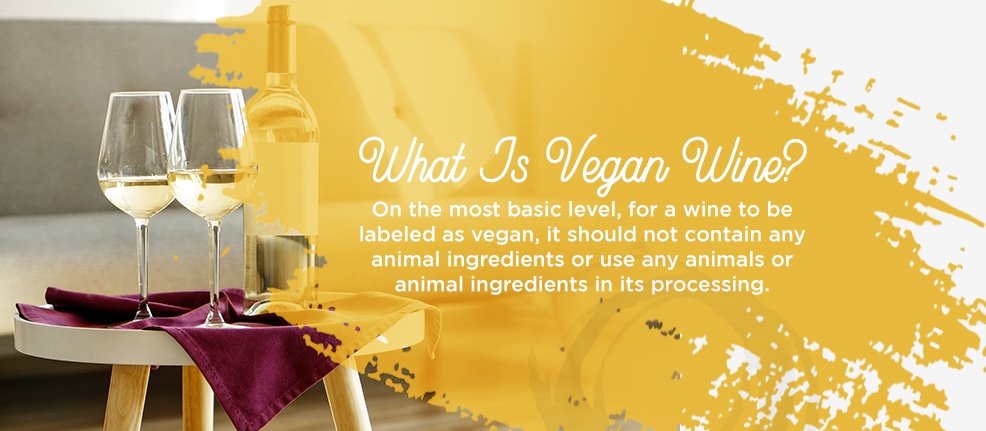
On the most basic level, for a wine to be labeled as vegan, it should not contain any animal ingredients or use any animals or animal ingredients in its processing. Most wines are simply grape juice with some yeast added in the fermentation process — so what makes a wine not vegan? The reason has to do with the special filtration or clarification process in winemaking. This special process for clarifying wine is called fining, and it doesn’t always use vegan or even vegetarian ingredients.
How the Wine Fining Process Introduces Animal Products
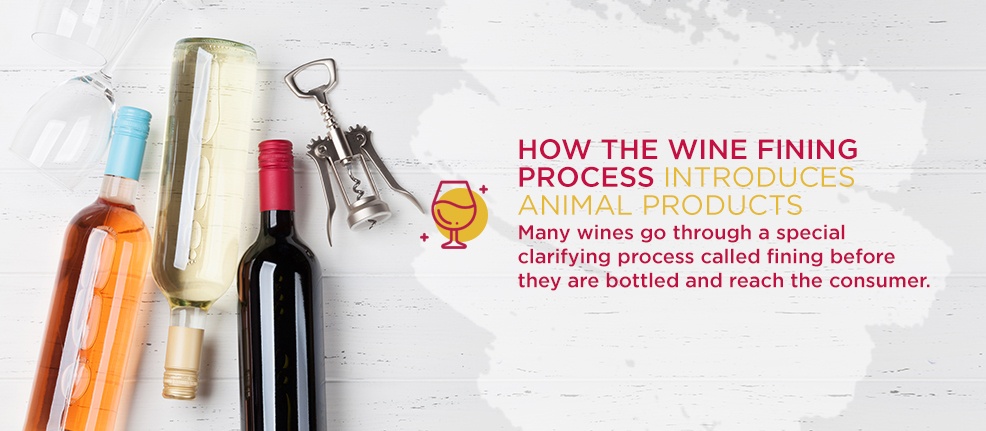
Many wines go through a special clarifying process called fining before they are bottled and reach the consumer. Wine that is young — that is, it hasn’t been aged — can have an assortment of small particulates or sediment in it that makes it appear somewhat hazy. These particles can include certain proteins, tannins, tartrates, polysaccharides and phenolics.
None of these natural particles are particularly harmful to the wine drinker. However, wines with a bit more clarity look more palatable to most people, so the fining process has become a common practice in winemaking. With some wines, the process can also give a more pleasing aroma, taste or color, or remove some of the bitterness of a wine.
As they age, wines tend to lose this hazy quality on their own. To speed up the process and ensure quality and clarity, some winemakers use a variety of fining agents. The fining process helps get wines to the market faster and can save winemakers money by speeding up the production. These added ingredients are often a type of protein, and they act like a magnet, grabbing on to the small particles that make the wine look hazy.
Without the fining agents, most of these particulates would be too small to filter out. But when these agents are added, they attract the molecules and make larger particles that are easier to filter out of the wine. Many years ago, ox blood was commonly used as a fining agent. Ox blood has fallen out of fashion — and its use is now banned in both the EU and U.S. — because of mad cow disease scares.
Animal-Based Wine Fining Agents
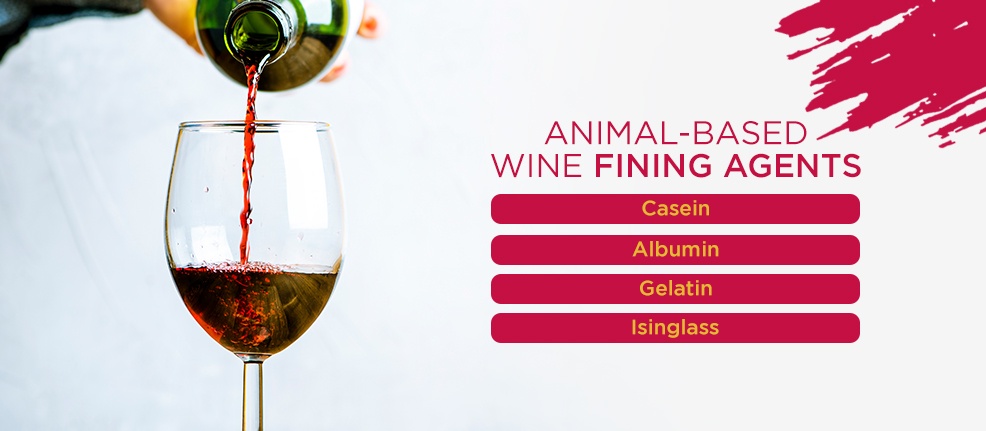
Today, there are many different types of fining agents, and each one is typically used for different purposes. It is important to note that all these fining agents are filtered out from the finished product. However, many vegans and vegetarians do not want to consume a product that has used animal products in any part of the manufacturing of the item.
A good comparison to understand this would be vegan cosmetics. Many of these products do not have animal ingredients in them, but some companies perform animal testing. Overall, there may be harm to animals in purchasing the product, even when there are no ingredients directly in the products. In wines, there is also a slight chance that some residual particles of the fining agent remain in the wine in very small amounts, and for many vegans, this is something they would rather avoid.
Less commonly used animal-based fining agents include blood and bone marrow, fish oils and chitin — a powder derived from the shells of sea crustaceans. The most commonly used fining agents are largely sourced from animal-based ingredients, and include the following:
1. Casein
This additive is the main protein found in milk and it is commonly used for fining white wines and sherries. Casein is especially good at reducing phenolic compounds in wine, which can cause bitterness and browning. Because it comes from milk, casein is suitable for some vegetarians, but not for vegans.
2. Albumin
Albumin, or egg whites, is another commonly used fining agent. It is also good at removing phenolic compounds and is more often used in red wines to give them more soft and supple qualities. As albumin is part of an egg, wines that use this fining agent would be acceptable for some vegetarians, but vegans would not find it suitable.
3. Gelatin
Also commonly found in gummy candies, marshmallows and jelly desserts, gelatin is a byproduct of the meat industry that is made by boiling bones, ligaments, tendons and skin from cows, horses and pigs. As such, both vegans and vegetarians generally avoid this ingredient.
As a fining agent, gelatin is used in a variety of wines. For white wines, gelatin reduces the compounds that can cause haziness, bitterness, astringency or a browning of the color. It’s also used in some red wines to reduce bitterness and astringency, as well as to prevent loss of color. Gelatin is one of the most aggressive fining agents and must be used carefully so it doesn’t remove too much of the color or subtleties in the flavor notes.
4. Isinglass
Isinglass is a collagen protein substance that comes from the dried swim bladders, and sometimes skin or other tissues, of certain types of fish. This makes it something to avoid for vegans and vegetarians alike. As a fining agent, it is most often used for white wines as it can successfully clarify the wine without affecting the level of astringency as much as other agents.
It can also remove harsh tastes while bringing out more delicate, fruity notes in the wine. Isinglass is also used in a similar process to clarify many types of beer. Recently, the famous beer brand Guinness changed their process to exclude isinglass and make their beer suitable for vegans to drink.
What Makes a Wine Vegan-Friendly?
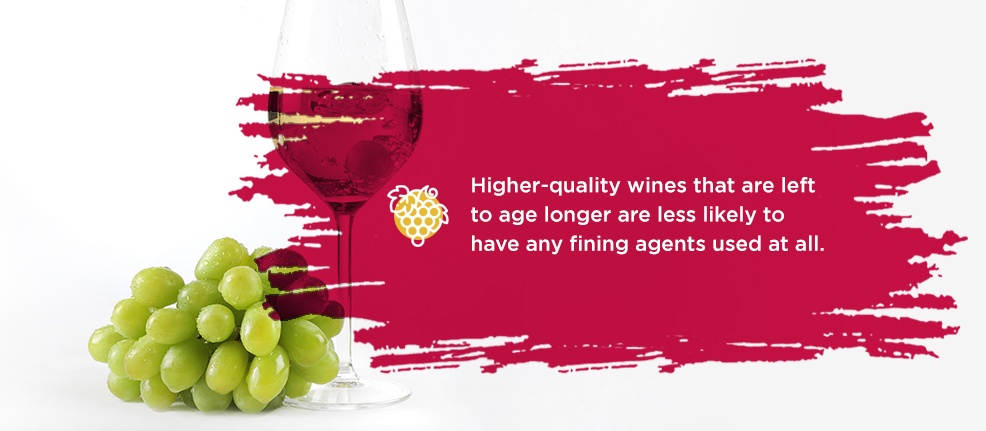
With so many non-vegan ingredients commonly used as fining agents, what can winemakers do to make a vegan-friendly wine? One of the easiest ways to make a vegan wine is to skip the fining process. Fining is not required to make good wine, so many vegan winemakers skip this step altogether.
Higher-quality wines that are left to age longer are less likely to have any fining agents used at all. It’s important to note that fining is not the same as filtering, and wines can still go through other filtering processes without any fining agents. The good news is that there are lots of wines available that do not use any type of fining.
Vegan Fining Agents
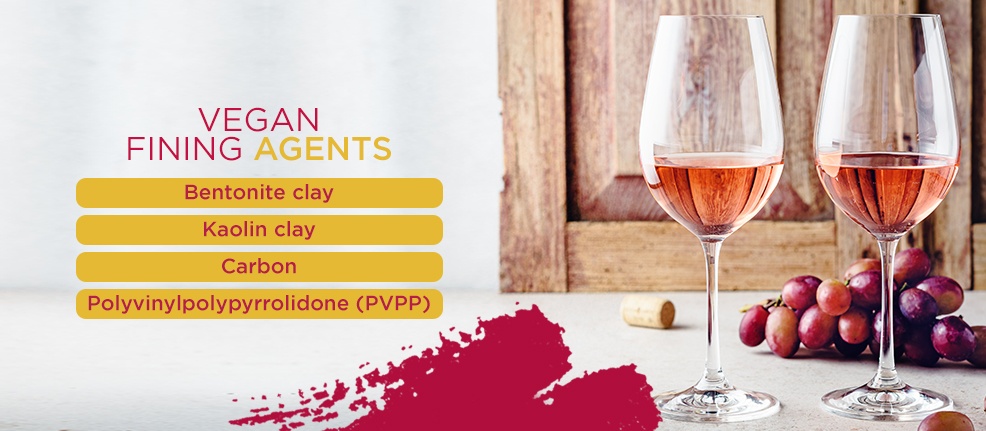
For other wines that need to get to the market quickly, don’t have time to age or have other needs that require fining, there are some vegan options for fining agents. While they may not be as common as the animal-based fining agents, these ingredients are slowly gaining in popularity as the demand for more vegan wine increases. These plant-based alternatives can all be used as fining agents in wine:
- Bentonite clay: By far the most commonly used vegan-friendly fining agent is bentonite clay, which is very effective at absorbing proteins and other particulates in wines. Powdered bentonite is added to hot water to make a slurry, which is then added to the wine to clarify it. Bentonite comes from weathered volcanic ash and can have different mineral properties. It is more commonly used to clarify white wines.
- Kaolin clay: A little less common than bentonite clay is kaolin clay. This is a mineral clay named for a Chinese village, but it can be found all over the world. Kaolin clay is popular in skincare and cosmetic applications, and it can also be used for wine fining.
- Carbon: Another popular vegan fining agent is carbon, in the form of activated charcoal. Carbon is often used for both white and red wines, decreasing brown and pink tones in white wines and reducing excess color from red wines. It also works well for getting rid of “off” flavors in any type of wine.
- Polyvinylpolypyrrolidone (PVPP): This agent is a synthetic polymer that can be used in white wines to reduce compounds that cause browning or pinking of the color, as well as the astringency of the wine. It can also reduce bitterness in red wines and brighten the color, but it is not used very often for red wines. As a fining agent, PVPP is known to be more gentle than other options and is great for preserving the natural flavor notes of the wine.
Other vegan-friendly fining agents include limestone, plant-based casein, silica gel and vegetable plaques. These fining agent alternatives are safe for all vegetarians and vegans.
Other Vegan Concerns in Winemaking
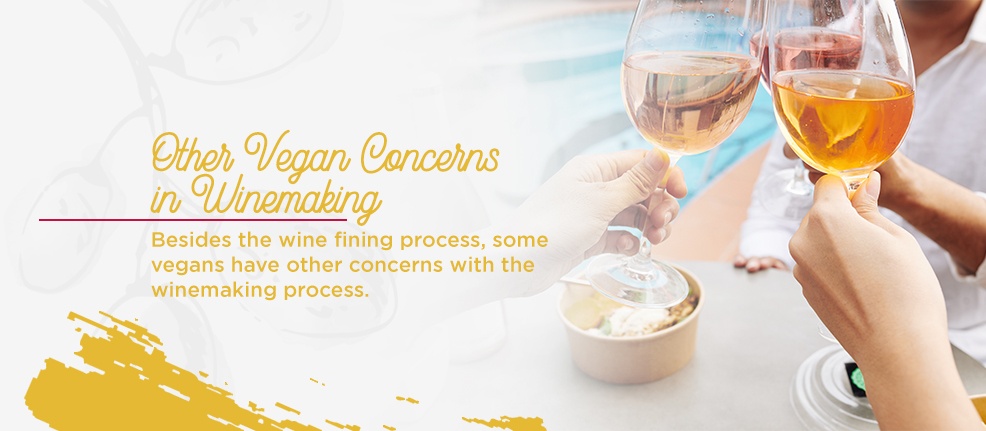
Besides the wine fining process, some vegans have other concerns with the winemaking process. This can include agglomerated corks, which are economical corks made from granulated cork byproducts. These corks are like a version of particleboard, and they often use different types of glues to hold the cork granules together. Unfortunately for vegans, the glue is usually made from milk proteins or gelatin.
Other wines may use beeswax in their corks or to seal the top of the wine bottle and cork. Strict vegans generally avoid products made from bees, like honey and beeswax, as it is seen as an exploitation of these insects. Like with fining agents, these cork ingredients don’t make their way into the final product that is consumed. However, many vegans would rather avoid these products because animal ingredients are used in the production and packaging.
How to Tell if Wine Is Vegan
With more knowledge about the fining process and what makes some wine not vegan, it’s hopefully a bit easier to know what to look for. The problem is that many wines do not include information about the fining process and what ingredients were used on their labels.
To make things more complicated, some winemakers may use a combination of fining agents — maybe even a mixture of vegan and non-vegan ingredients. Unfortunately, you can’t tell if fining agents were used, or which ones were used just by looking at a wine or tasting it. You may have to dig a little deeper and do some of your own research to find suitable vegan wines that you like.
Why Vegan Wine Labels Are Important
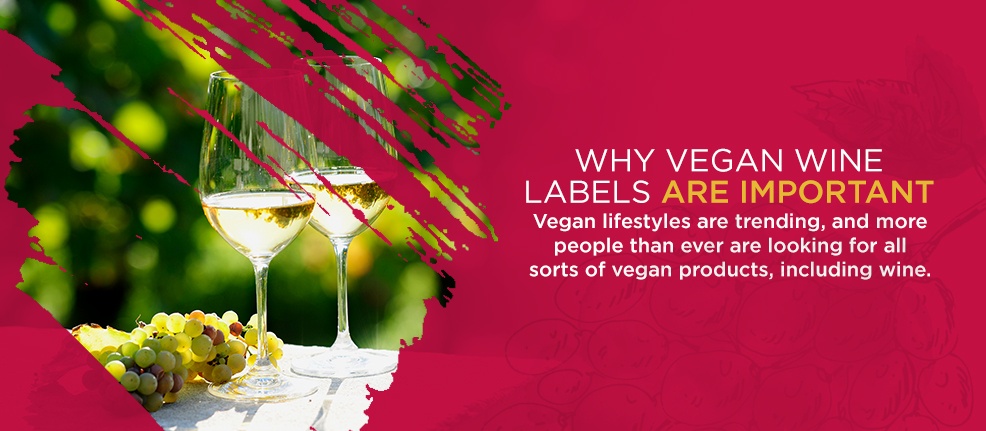
Vegan lifestyles are trending, and more people than ever are looking for all sorts of vegan products, including wine. Many winemakers are aware of this trend and are starting to denote vegetarian and vegan designations on their labels and in their advertising to make it easier for vegans to shop for wine. However, this is not an industry standard. In fact, there are no current labeling requirements from any governing body regarding fining agents, other additives or even whether a wine is vegan-friendly.
In the U.S., two different organizations are responsible for mandated labeling on alcoholic beverages — the Food and Drug Administration (FDA) and the Tax and Trade Bureau (TTB). Today, the only ingredient mandated to appear on wine labels is added sulfites. In both the U.S. and across Europe, a recent push for more transparency and ingredient listings on wine labels is taking hold.
Consumers today want more information on the products they buy and use, and wine is no exception. They are more informed and have more concerns about ingredients that are organic and biodynamic and whether they contain GMOs and potential allergens. The demand for more precise labeling is largely consumer driven and could become standard in the near future.
How to Find Vegan Wines
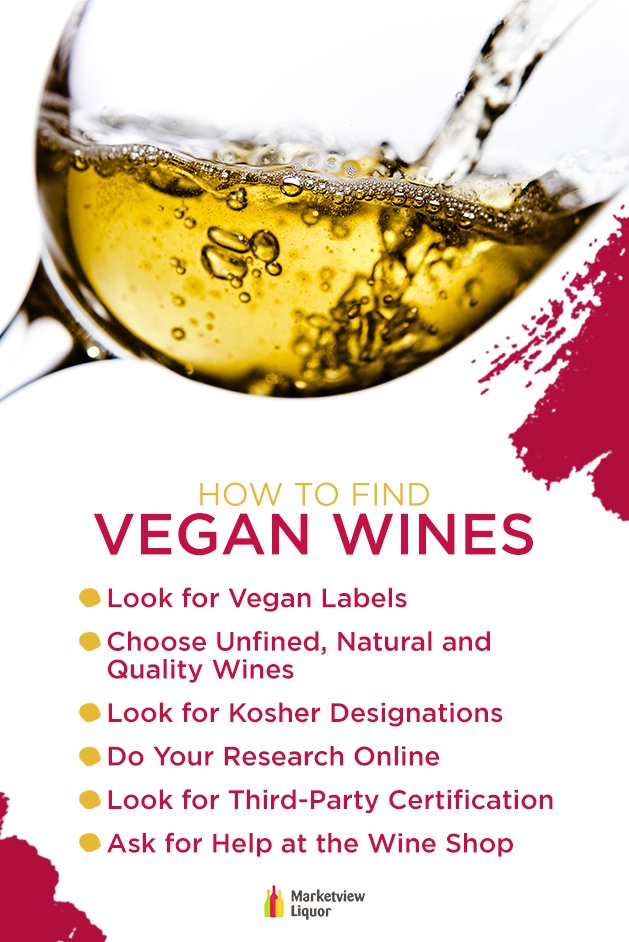
If the ingredients aren’t always listed on a wine label, how can you find a vegan wine? While it may seem like a difficult task, you can find great vegan wines of all varietals to enjoy. Try these tips for finding and shopping for vegan wines you’ll love:
1. Look for Vegan Labels
Not all vegan wine is labeled as such, but there are many great options that do include this on their labels. Watch for a “V” or “Veg” or other vegan symbol on the wine labels. As the demand grows for both vegan products and more transparent product labeling, more wine companies are choosing to designate their wines that are vegan-friendly.
2. Choose Unfined, Natural and Quality Wines
While not every unfined wine may be labeled with this information, if you see this on a wine label, it’s a good indication that the wine is vegan, as no fining agents are used whatsoever.
Many wine companies are also labeling their wines as natural, organic and biodynamic. These labels do not guarantee that the wine will be vegan, but it’s highly likely because most natural wines are not fined. Some wine importers even specialize in natural wines, and their selections will be mostly vegan.
Cheaper wines may be more convenient and easier on the wallet, but they are more likely to use fining agents to rush the wine to the market quickly. High-quality wines are more likely to have been aged naturally without using fining agents.
3. Look for Kosher Designations
Kosher and vegan don’t mean the same thing. However, there is a good deal of overlap between the two, so this is a good place to start when you’re searching for vegan wines. Kosher wines cannot have animal byproducts added like gelatin, casein or isinglass, so usually kosher wines are also suitable for vegans. Because the details for kosher designations are different than vegan ones, you should still do your own research on these wines to make sure they are actually vegan.
4. Do Your Research Online
Look up your favorite wine companies to see if you can find more information about whether their wines are vegan. Reach out and ask them about their fining process or any added ingredients. If you find out a wine isn’t vegan, you can also reach out to the winemaker and suggest they consider a vegan alternative so more people can enjoy their wines.
Additionally, you can check out Barnivore online, a database of thousands of wines that are checked and double-checked for their vegan status. The directory also lists vegan beers and liquors, and is a great resource for any vegan.
5. Look for Third-Party Certification
There are several reputable organizations researching, testing and providing certification for all sorts of vegan products, including wine. Once certified, winemakers can choose to display the certification logo on their label, making it easier for vegans to find their wines.
One of the most well-known certification organizations is BeVeg, a law firm devoted to researching and certifying vegan products. If you see the BeVeg logo, you can be sure the product meets the exacting vegan standards of the organization and is safe for consumption. The BeVeg app is available to download for free and includes a searchable database of certified products.
6. Ask for Help at the Wine Shop
When you’re shopping for wines, you can always ask for help in finding the right wines. Wine store employees and online representatives are usually knowledgeable about the wines they carry and can direct you to wines you might like that also fit with your values. If you’ve found specific vegan wines that your favorite shop doesn’t carry, you can also request they order them for you.
Browse and Shop Vegan Wine Online With Marketview Liquor
It’s easy to browse vegan wines online from the comfort of your home and have them delivered! At Marketview Liquor, we are proud to offer a wide selection of vegan wines online, so no matter what types of wines you like, you’re sure to find them here.
We know it’s important to find wines that meet your dietary standards and values, and you can trust our selections to be completely vegan-friendly. If you have any questions about finding vegan wines or have special requests, reach out to us online and we will get back to you as soon as possible. We are happy to help you find just the right wine!


